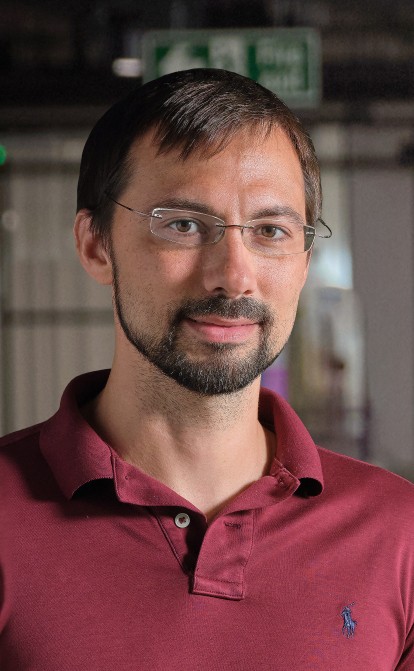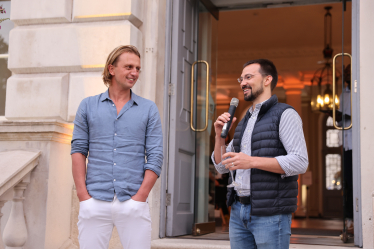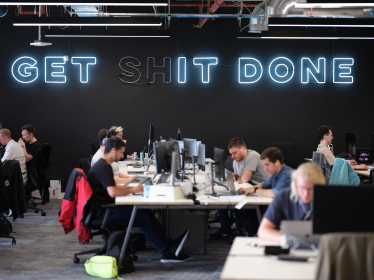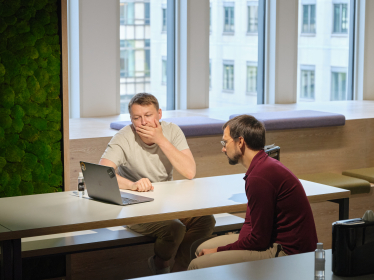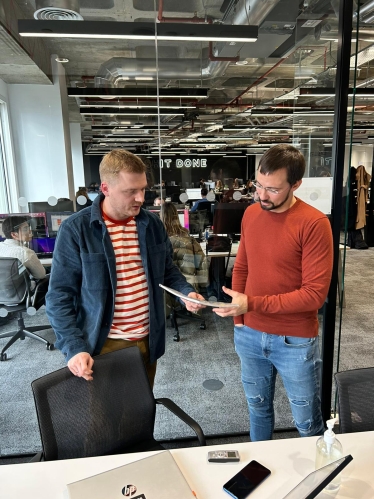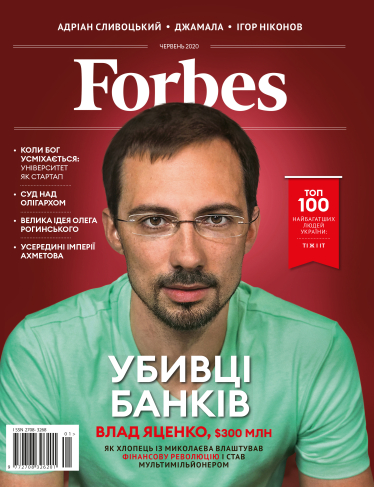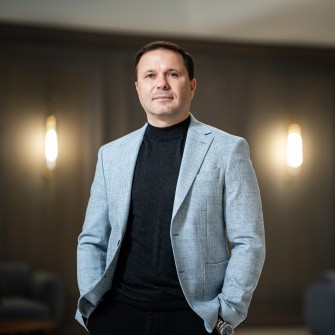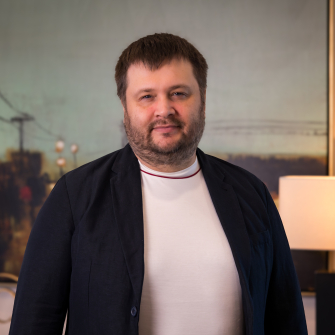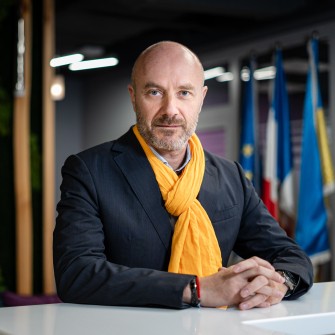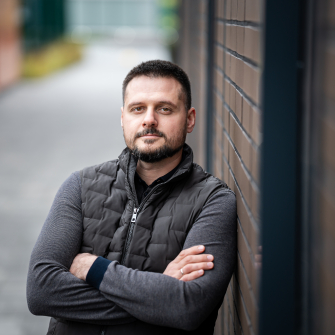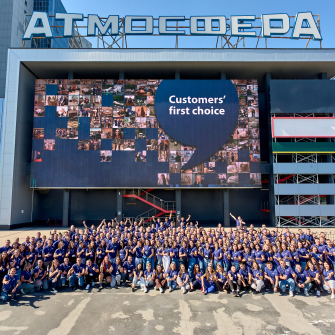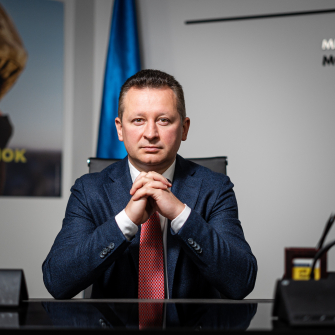How neobank Revolut plans to expand worldwide, why it is interested in Eastern Europe, and how it differs from dozens of other neobanks in the world. Explained by the co-founder of Revolut, Ukrainian Vlad Yatsenko. We also talked about his attitude towards Russia and the war in Ukraine.
Купуйте річну передплату на шість журналів Forbes Ukraine за ціною чотирьох номерів. Якщо ви цінуєте якість, глибину та силу реального досвіду, ця передплата саме для вас.
39-year-old Vlad Yatsenko has been running the marathon of digitalization of the European financial market for seven years. After graduating with honors from the Mykolaiv branch of the Kyiv-Mohyla Academy, he went to work as a developer in Poland and later moved to London. There, his colleague from Credit Suisse, Russian Mykola Storonsky, suggested Vlad join the development of a fintech project. In 2015, the neobank Revolut emerged with Yatsenko becoming its co-founder and technical director.
In 2021, Revolut became the most expensive startup in Great Britain, having raised $800 million at a valuation of $33 billion. The same year the neobank was profitable for the first time (£26,3 million). ʼ2022 will also be profitable,ʼ says Yatsenko. Over the past two years, the number of Revolut customers has more than doubled to 25 million. The fintech service operates in 35 countries and offers dozens of services, varying from money transfers in any currency to cryptocurrencies.
But there’s one pinnacle Revolut can’t take yet – Britain’s Financial Conduct Authority (FCA). They applied for a banking license in Great Britain a year and a half ago but have not received it yet. Why would it take so long? One of the hypothesis is the background of its co-founder Mykola Storonsky. His father holds a high position in Russia’s Gazprom, sanctioned by the U.S. This is not the reason of the delay, says Yatsenko. According to Storonsky, he renounced his Russian citizenship, holds a British one, and left the Russian Federation 18 years ago.
ʼWe’re close to the finish line,ʼ Revolut’s CFO recently told The Guardian, remarking on the acquisition of the license. It will enable Revolut to issue loans – one of the most popular ways for classic banks to make money. And it might be a sign for regulators in other countries.
Revolut’s latest investment round turned Vlad Yatsenko into a billionaire. However, Forbes U.S. significantly overestimated neobank a month ago. Yatsenko’s fortune fell from $1,1 billion to $500 million. ʼIt doesn’t matter,ʼ he replies.
With the start of the full-scale invasion, Revolut enabled Ukrainians to use neobank in record time. ʼMy anger at Putin’s regime traces back to 2014,ʼ Yatsenko says, speaking about Russian invasion of Ukraine.
Forbes talked with Vlad Yatsenko about Revolut’s plans, the war in Ukraine, attitude towards Russia, and more.
Why should a neobank become a regular bank
Present-day key event for Revolut is obtaining a UK banking license. You have been expecting the approval for almost year and a half. To put in simply, what does it offer a global fintech startup?
It will enable us to provide banking products we already do in Europe, such as loans and credit cards. The e-money license we operate within the UK was not designed for a company of our size. We need to upgrade to a banking license to offer banking services in the UK itself.
The license will as well transform a tiny thing sitting in the minds of consumers –it’ll get rid of doubts that Revolut is not a bank in contrast to its competitors.
Do people think Revolut is not a bank?
Some people don’t understand the difference, and those who do find it a stamp of confidence. Plus, there is an actual stamp – a deposit insurance scheme giving people a guarantee. These factors are important for consumers, and so are for business.
Is it possible to presume you’ll double your growth once obtaining a license?
Yes, it is.
As of now, your clients are individuals having their own income. You help them easily manage their money, analyze, invest, and not to spend excessively. Credit business is the business of classic banks. People come to spend other people’s money. Wouldn’t it blur the perception of you as a fintech company that has been building a more affluent audience?
I think not. Our users lack these services. We are experienced with loans in Europe: Revolut launched credit cards last year in some countries and have seen positive feedback. Credit is one of the fundamental financial services.
Didn’t you start as the antithesis of banks, a revolutionary tool? Wouldn’t it mean turning into a standard bank with distinct features?
Everything has already existed a long time ago, we did not create a new ground-breaking sphere. We provide financial services in a unique manner with modern distribution and user-friendly service and extract then finest from contemporary technology, and then the industry itself is transcending to such a level of civilization. The fintech boom began after the financial crisis. It was the impetus to alter finances.
Had you known seven years ago how much time you would have to spend on passing through the regulatory jungle rather than creating a product, would you have gone the easier way and maintained the databases of a classic partner bank type?
Practice has taught me that anything vital for the business is to be done on your own. Partners do limit you. Everything should be agreed upon them since they are the holders of the license and responsible for all the regulatory matters. Under such circumstances, the partner impedes the company’s development, especially when its ambitions are much greater than the partner’s.
The world of technology companies and financial regulators are two planets not even within one galaxy. Speed and flexibility versus meticulousness and slowness. How do you bridge this gap as a technology company?
We have our own compliance and regulatory teams. The very process of launching a new product and entering the market is heavily dependent on the situation and how tightly we have worked with the regulator. Financial markets differ from country to country. Some areas show openness to fresh businesses, and some are difficult to enter, or the regulator is not concerned.
When expanding, we neither establish the new nor independent company. It was our previous experience with failures in it. We were keen on entering all markets in a split-second supposing it would be less complicated.
Why would you think this way? There weren’t so many examples of neobanks back then.
This is of ‘ignorance is a bliss’ kind. If you don’t know, then you are less scared. This is also an essential factor for individuals launching startups. When one is rather too experienced and aware of all the challenges, they stand self-liming.
You still need to have a suitable temper backing your ambitions and not allowing you to stop
once faced with the first obstacle.
Given Russia attacking Ukraine and Mykola Storonsky’s family ties, weren’t there even more questions from regulators to Revolut? Could it slow down the process of granting a license?
Not at all. We go on functioning and launching products as ever. As the war began and such questions arose, we were given an answer. There would be no block.
How are the progress and licensing advances in the U.S.? I assume this is far more complicated, isn’t it? You are to work with the states separately, am I right?
Yes, the process takes much longer. However, we are not mid the process obtaining a license there. We are working with a partner bank.
Am I wrong to think you weren’t that enthusiastically looking at the U.S. market?
All eyes are on Great Britain now. You are to start a bank here first, and then it will get easier.
Might it be a springboard into the world? Should you get a license in Britain, would it be handy in convincing the U.S., Australia, and Japan faster?
I believe so. Regulators look at what other regulators are doing. We are a British company, and our main regulator is British, but this is definitely a signal to others.
Western Europe, Eastern Europe and Asia
Revolut serves 25 million customers. Mykola Storonsky announced an ambitious plan: 10 million customers across Asia by 2025. What is the current structure of customers per country?
Great Britain occupies about 20%, then goes Western Europe. Ireland and France – about 2 million each. Poland and Romania – over 2 million customers each. Lithuania is not far behind. Spain and many others are millionaires. Revolut is relatively well-known in Sweden. Overall, the Scandinavian countries are not so close as Eastern and Western European are.
Why Eastern Europe?
We are looking at the financial sector of the country, what banks market is represented by, to what extent local banks are developed, and whether the vast majority of banks are foreign or not.
Which of these factors best indicates whether one market is developed or not: the abundance of local banks or transnational ones instead?
Local banks signify development. Lithuania and Romania are markets where services are provided by Western Scandinavian, Dutch, and Austrian banks. In Poland, there is a mix of banks but locals prevail in it. When we came to Poland and didn’t have banking licenses, the banks responded and began trying to do exactly what we do. Our multicurrency card was released, and this is when the boom began. Banks proceeded to make clones of multicurrency cards and launch other products. This indeed did not happen on the markets with strong foreign banks presence.
In what countries are you planning to grow most?
In Asia, we are expanding in Singapore and Japan. In India, we are just getting rolling. In Australia, we are working on obtaining a banking license. We are also launching in New Zealand.
China?
No, he says smiling.
Is the U.S. a second target after the UK license?
We have three main global goals: to deepen in Europe, localize, and popularize the product across various countries there, the U.S., and Latin America. Our mentality is still quite of a startup-like, we have got both budget and a program for five years ahead. Prior to this time, the market must diverge.
Why do you think Revolut, a British fintech, could take a bite out of major local players, for instance, in Latin America? There is quite a successful Nubank. What makes you preferable?
There is a large population of traditional banks facing challenging time with. There are advanced banks but the majority initiate access to basic credit card services. We are entering with an open package of vast unavailable before the number of products. In fact, Latin America has been closely watching the events in Europe. Individuals in the industry are aware of Revolut and were copying what we had been up to.
Have you ever worked in the Russian market as a service provider?
No, we haven’t. There was indeed a short attempt, but there came license and other issues. We did not enthusiastically look at the Russian Federation as its market is state-controlled, pseudo-open.
Revolut office in London Фото надано пресслужбою Revolut
Revolut office in London Фото надано пресслужбою Revolut
Revolut office in London Фото надано пресслужбою Revolut
Revolut office in London Фото надано пресслужбою Revolut
Revolut office in London Фото надано пресслужбою Revolut
Revolut office in London Фото надано пресслужбою Revolut
What makes Revolut so special
Why do traditional banks heavily lose in the digitalization of the financial sphere to you, neobanks?
The world went technological path, and this financial industry felt comfortable. Banks, however, did not move as quickly.
Why is it so?
The gap didn’t form overnight, but the banks weren’t enough motivated to repeatedly upgrade. The largest banks are too large for modifications to be implemented smoothly.
Revolut has introduced dozens of functions. The application has turned into a sort of financial supermarket. What is the next great idea for Revolut?
First, we create an ecosystem. So that there are no restrictions on access to financial and payment services. When entering a new market most competitors come up with a local clone. Go to the AppStore and you’ll find several applications for each market.
Are you talking about the ecosystem from the product and expansion points of view? You intend to fit everything into one app, do you?
Yes, we do.
Wouldn’t it make you unfocused and without a clear sense of what Revolut is?
There is an understanding of our product becoming more complex. We are under constant stages of rethinking.
What was the last thing rethought in Revolut?
I will not say we have completely achieved the desired results, but we removed Revolut’s interface hyper-complexity. So that all features are available when you need them. There used to be so many payment options on one screen! Now it has been simplified into a normal messenger-level interface. All the complexity disappeared to the point I just need to transfer money to someone as if it were a secondary process.
Everyone seems to have it.
Not really. We provide payments in many countries locally, and thus vast majority of payment methods. Each country has its own. Our task is to offer services ‘seamlessly’. The client should not experience similar problems.
You grow rapidly, and thus with growth diseases. What has Revolut been through?
With children growing up quickly, parents are short for time to buy school uniforms for them. We had a similar scenario in 2017. There was a big shock for the company when the flow of new faces exceeded the number of currents. Adaptation, people come with their habits. This creates chaos you cannot fully control at first. The issue of internal knowledge transfer. Fewer people had them than to whom they should be given.
ʼ2022 will also be profitable at Revolutʼ
Fintech company Stripe, one of the most valuable startups with a valuation of $95 billion recently had an internal revaluation to $63 billion. Klarna was once the most valuable fintech in Europe with a valuation of $45 billion but dropped to $6,6 the last round. An alarming trend for the market. Have you done an internal Revolut revaluation?
We haven’t got an internal revaluation. Our ambition is to be a much more valuable company than we are now.
When will Revolut be worth $100 billion?
In a few years, hopefully. If some events in the world did not slow down economic development, it would be better. No one could predict there would be a war in Ukraine a year ago, and neither one planned COVID.
Will 2022 also be profitable for you?
Yes, it will.
Even more profitable than 2021?
I can’t say yet, we’ll have to see.
Mykola Storonskyi recently said that the company’s last attracted money will last for two years. When should it become clear Revolut needs to open a new round?
Not at this stage.
You are not planning a new round of investments yet, aren’t you?
No, we aren’t.
Any plans for an IPO?
No.
Transactions with cryptocurrencies produced 30-35% of Revolut’s revenues in 2021, now – only 5%. However, you recruited professionals who would deal with crypto in August. What is this source of optimism?
Numbers of 30-35% were when the crypto market was rising. Crypto is not a pillar of our business. We are not a startup jumping into crypto with no long-term plans. We are currently looking at the crypto separately from the rest of the products. There is no true dependence on it.
Should states enhance crypto market regulation? There are hundreds of millions of new users exploring the digital finance world inhabited by hundreds of thousands of fraudsters.
Yes, they should. Regulation improves the market. People will have rules telling them what can be done and what not. There would be less chaos this way. Regulators do not create the market; they react to what happens in the market.
Are 25 million customers a good result for a neobank operating for almost seven years?
If consider our ambitions, I would call this a beginning.
Forbes U.S. lowered the ratings of large startups and therefore of their co-owners at the end of January 2023. Forbes U.S. lowered the valuation of Revolut to $13,8 billion (from $33 billion), and Yatsenko’s fortune to $500 million. Revolut did not accept this revaluation.
ʼI witnessed anti-Ukrainian propaganda in Russia back in 2008.ʼ
Do you remember founding out about Russia’s invasion of Ukraine?
Things were tense prior to February 24. A week or two before the 24th, we began organizing the evacuation of our people. They were offered to leave Ukraine temporarily, and then if nothing happens, return home. Most employees did not believe the attack would take place, so they refused to leave in time. Then we ended up gathering people across entire Ukraine. The anxiety was so high the team here worked around the clock.
What did you feel on February 24?
Malice. My anger at Putin’s regime traces back to 2014. I personally experienced anti-Ukrainian propaganda in Russia when in Moscow in 2008. I was in shock after watching the Russian news.
It’s been a year since the invasion, and you are in touch with plenty of people. Did the war change the attitudes toward Ukraine? Is there still an idea of Ukraine being an entity of Russia?
Those who know me understood this in a split second. When it comes to historical and cultural moments my acquaintances do not confuse Ukraine and Russia.
Do you consider yourself an ambassador of Ukraine?
In a certain way, yes. This comprehension arose once I enrolled into a Ukrainian school in a Russian-speaking town.
Did you study at a Ukrainian school?
The last two classes. Then came the understanding of what kind of society it is. Children outside school speak Russian out of fear to be bullied for using Ukrainian. And then you visit their homes, and some of the family members speak Ukrainian. It’s like a hidden culture.
Do you remember your first conversation with Mykola after the invasion broke out? You have both lived in Great Britain for a long time, but Mykola’s motherland attacked yours. What did you talk about?
Above all, Mykola has got relatives in Ukraine. There were not many words at that moment as there was only shock. What was on our minds is family, our loved ones. This was far from a situation where a polemic can be held.
Your father is a former military man. What does he think of this war as a Soviet army man?
My father is in Ukraine. He hasn’t got an ambiguous view. He is a Ukrainian and a patriot.
I am speaking about Russian army as a Soviet army. Could he explain to you where schizophrenia comes from?
I was aware of this stuff since childhood. My father left the army once the USSR collapsed as a lot of strange fuss began happening there.
Forbes Ukraine digital editor-in-chief Viktor Kishchak and co-founder of Revolut Vlad Yatsenko Фото надано пресслужбою Revolut
ʼThe team of the Ministry of Digitization of Ukraine is very proactive and quick to learnʼ
Who was the decision to help Ukraine and open Revolut for Ukrainians initiated by? How was such an idea born?
This was the idea of one of our employees, he is not Ukrainian. Refugees do not have documents, and it is complicated to properly register an account. We launched Revolut for Ukrainians in a few weeks.
A fascinating example to the market of a swift launch. Is this your fastest time on a market yet?
Yes, it is. We could have implemented it even faster. Some lessons were learned.
How many Ukrainians use Revolut now?
There are approximately 450 thousand open accounts. And about 100 thousand of active users.
Do you know anything about the Ukrainian fintech market? Have you heard of monobank?
I haven’t used it myself, but I’ve heard positive reviews. I tried logging into the system a long time ago but failed.
From the perspective of products, it has been evolving rapidly, especially prior to full-scale war. It is to enter the Polish market soon. The response speed to customer needs is like yours.
The big difference is a functioning model. monobank is a technological partner.
Are you following Ukraine’s digitalization efforts? You must know the Ministry of Digitalization and its chief Mykhailo Fedorov. How would you rate their performance?
I spoke with Fedorov in our office. Well done, they are proactive and quick to learn. The marketing machine is the core thing there. Everything that helps you move. And this is rare. From someone who does not live in Ukraine, my feedback was that it is crucial for the country to significantly improve its position in the ranking of corrupt countries.
May digitization be handy in this?
Hopefully.
ʼElon Musk is a marketing machine occasionally carried awayʼ
When the first issue of Forbes Ukraine came out with you on the cover three years ago, we outlined your workaholism in the paper. Do you still work until 10 pm each day or are you taking it easy now?
Not always. My schedule is such that I work better at a late hours. I start my work no earlier than 9.30 now.
Your share in Revolut was 5% three years ago. Did it so remain?
No, it didn’t. I have got 3% now.
Why did you choose fintech? Is it a vision of finance as most in need of a digitalization cure? Or is it just a pragmatic calculation?
Everything is pragmatic. There was fertile soil in the market to enter. Regulators became stricter aftermath crisis in Europe. Yet arose opportunities for new players with more straightforward e-money products. Once you start doing it, you immediately realize there are plenty of other challenges on the market.
Have you ever dreamed of becoming a billionaire?
Haven’t even dreamt of it. It doesnʼt matter. The public is fond of measuring these facts in this manner.
Which global entrepreneurs or companies are role models for you?
I have no specific one in mind now. I liked the approach of Google’s rebuilding; they did a lot of good things from the organizational point of view.
You’re more of a calm and calculated approach, right?
It depends. I loved the culture of Google, but the one created before it became a giant. Descent conditions but with a lack of ambition and motivation.
Elon Musk sets up driving or better say aggressive culture in his companies. Does he impress you as an entrepreneur?
He has things I agree with, but he trivializes a lot. If look at it pragmatically, he is a marketing machine occasionally carried away.
Ви знайшли помилку чи неточність?
Залиште відгук для редакції. Ми врахуємо ваші зауваження якнайшвидше.

